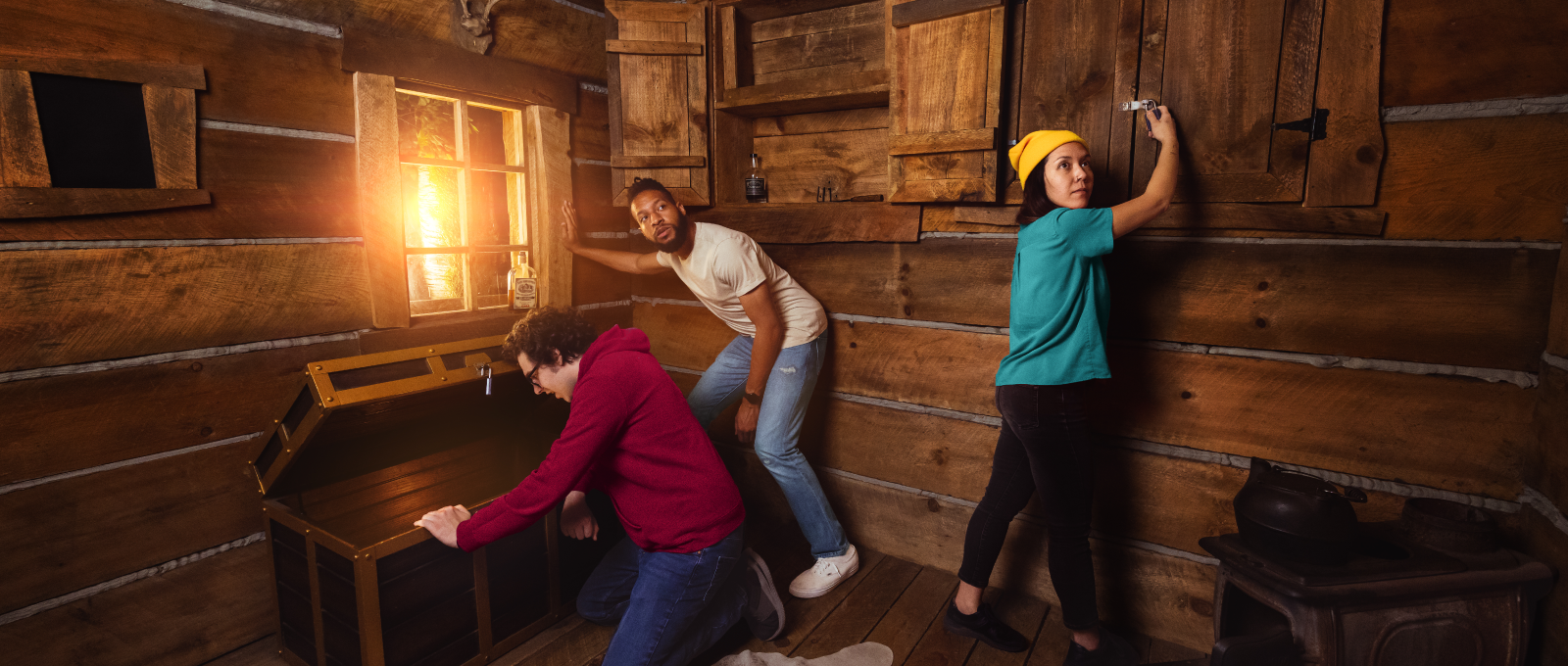Team-Building and Fun: The Perfect Day Out at an Escape Room in LA
Team-Building and Fun: The Perfect Day Out at an Escape Room in LA
Blog Article
Dive Into a Globe of Adventure and Problem-Solving in Escape Rooms
Escape areas have actually surged in appeal, providing an unique mix of adventure and cognitive challenge that mesmerizes participants of every ages. These interactive experiences submerse gamers in themed settings where team effort and essential thinking are extremely important to success. From unraveling detailed historic mysteries to browsing creepy, spine-chilling circumstances, each space offers a distinctive narrative that checks your analytic acumen. Whether you're a skilled lover or a curious newcomer, the allure of these immersive puzzles beckons. However what precisely gas this fascination, and how can one maximize their experience? The responses might shock you.
The Surge of Escape Rooms
Escape rooms have seen a significant surge in popularity over the past years, changing from particular niche home entertainment to a mainstream sensation. Stemming in Japan around 2007, these interactive problem video games quickly mesmerized target markets worldwide. The immersive experience of being "secured" in an area and working collaboratively to address problems within an established timeframe supplies an one-of-a-kind blend of excitement and cognitive challenge.
The surge of retreat rooms can be connected to numerous factors. The interactive nature of retreat rooms supplies a substantial comparison to the digital escapism prevalent in digital gaming.
Additionally, the social element can not be overlooked. Retreat areas foster cooperation and interaction, encouraging participants to merge their abilities and knowledge. This collaborative initiative not only improves the experience however likewise develops friendship amongst players. The constant advancement of challenge style and technological integration guarantees that escape areas stay fresh and challenging, contributing to their continual popularity.
Types of Escape Room Themes

One widespread theme is the "Enigma and Investigator" style, where participants represent detectives entrusted with addressing a crime or uncovering a hidden reality. These rooms frequently include detailed problems and narrative-driven obstacles that need keen observation and rational reasoning.
One more preferred theme is "Historical and Experience". Below, gamers could locate themselves in old Egypt, browsing via a pharaoh's burial place, or throughout The Second World War, deciphering adversary messages. These styles offer an academic spin, mixing historical realities with interesting gameplay.
For those looking for a thrill, "Scary and Paranormal" escape spaces deliver spine-chilling experiences. Embed in haunted houses or abandoned asylums, these areas depend on climatic results and psychological scares to heighten the tension.
Key Abilities for Success
Success in retreat rooms depends upon a blend of important skills that individuals should harness to overcome the diverse difficulties they will come across. Foremost amongst these works communication. Concise and clear sharing of info makes sure that all employee recognize explorations and can improve each other's insights. Equally important is teamwork; getaway spaces need a collaborative initiative, where each individual's strengths are utilized to tackle various problems and tasks effectively.
Analytical reasoning is additionally important, allowing groups to explore complex challenges and establish logical connections between disparate aspects within the original source the space. Time administration is an additional necessary, as the repaired duration of retreat space experiences demands efficient allowance of time to different jobs and challenges.
Adaptability and versatility ought to not be neglected. When preliminary strategies falter makes certain that teams can dynamically react to developing difficulties, the capability to pivot strategies. Finally, preserving a calm demeanor under stress aids in clear thinking and protects against the start of stress-induced mistakes. Proficiency of these abilities collectively enhances the probability of an effective getaway.
The Psychology of Problem-Solving
Understanding the psychology of analytic is critical for navigating the detailed obstacles provided by retreat rooms. Problem-solving is a cognitive procedure that entails acknowledging a trouble, producing feasible services, reviewing them, and after that implementing the very best program of activity. Cognitive psycho therapists have actually long studied this process, identifying numerous stages such as issue recognition, structuring the trouble, and making use of algorithms or heuristics to discover remedies.
Escape rooms develop an environment where participants need to quickly move via these cognitive stages under over here pressure. The high-stakes, time-constrained nature of escape rooms can generate a state of enhanced arousal, which can either boost or impair cognitive efficiency depending upon the individual's tension action. The Yerkes-Dodson Regulation recommends that modest anxiety levels can enhance analytic capacities, whereas too much anxiety can be damaging.
Furthermore, getaway rooms typically require collaborative analytic, leveraging team dynamics to improve cognitive processes. Understanding these psychological concepts can considerably improve one's ability to address intricate challenges efficiently.
Tips for First-Timers
Embarking on your initial retreat space adventure can be both thrilling and difficult. To improve your experience, it is necessary to approach it with an approach. Construct a group with varied skills. A mix of logical thinkers, creative minds, and excellent communicators is suitable. The more varied the ability, the better furnished you'll be to deal with different sorts of problems.
Communication within the team is paramount. Share findings and understandings without delay, as one person's exploration might be the missing out on piece another demands. Stay clear of tunnel vision; if a problem appears insurmountable, pass it on a teammate to get a fresh viewpoint.
Time administration is additionally crucial. Maintain an eye on the clock and allocate your time carefully. If a particular challenge is consuming also much time, it could be prudent to relocate on and return to it later.

Conclusion
Retreat areas provide a special mix of adventure, cognitive obstacle, and immersive storytelling, making them a popular choice for both enjoyment and skill development. The psychological advantages gained from these experiences extend beyond the Going Here retreat space, promoting improved cognitive functions and interpersonal abilities.
The continuous advancement of puzzle design and technical combination makes sure that escape areas remain difficult and fresh, contributing to their sustained popularity. - escape room
Similarly important is synergy; retreat rooms call for a collective initiative, where each individual's staminas are used to take on different challenges and jobs efficiently.
Time management is an additional important, as the fixed duration of retreat room experiences requires efficient appropriation of time to various jobs and challenges.
Understanding the psychology of problem-solving is crucial for navigating the complex challenges presented by escape areas.Furthermore, retreat rooms often require joint problem-solving, leveraging group characteristics to boost cognitive procedures.
Report this page